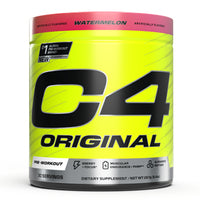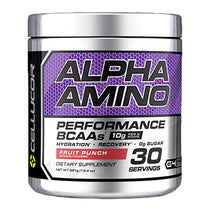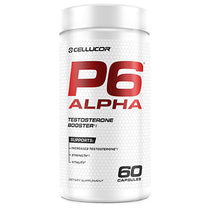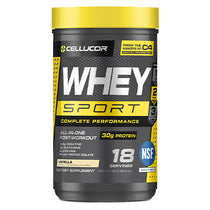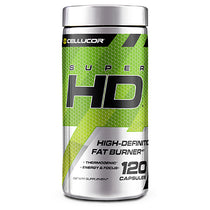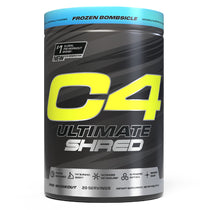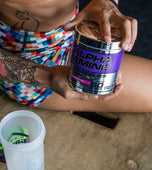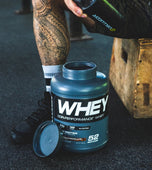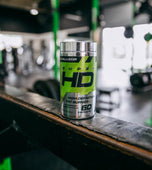We’re going to cover what is overtraining, focus on the common signs, and the strategies to recover from it. After reading this, you should be more familiar with some of the common signs and symptoms of overtraining. Plus, we’ll be sharing tips on which supplements can be used to help someone ease back into training.
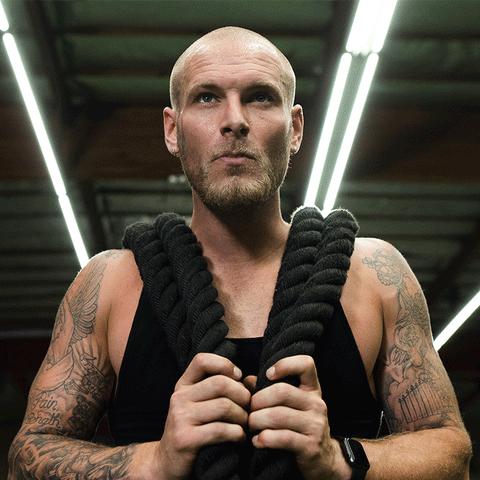
What is Overtraining?
Overtraining is a physiological state where the demands from training and life stressors exceed recovery capacity. Research indicates that common risk factors for overtraining syndrome include mean daily work/study hours exceeding 8 hours a day, a carbohydrate intake below 5 g/kg/day, a protein intake below 1.6 g/kg/day, and a caloric intake below 35 calories/kg/day.[1]
A study compared healthy athletes, athletes suffering from overtraining syndrome, and non-physically active adults across 117 parameters. The scientists identified low caloric intake, low protein intake, low carbohydrate intake, and poor sleep to be present in 100% of the cases of overtraining syndrome.[2]

Some important definitions to understand when discussing overtraining include
-
Functional Overreaching: short term decreases in performance lasting days to weeks, followed by an improvement in performance (supercompensation).[3]
- Non-Functional Overreaching: decreases in performance lasting weeks to months, followed by a full recovery.[3] It’s important to note that during non-functional overreaching, an increase in performance doesn’t occur as is seen during functional overreaching. Non-Functional Overreaching has been associated with prolonged recovery time, disturbed sleep, and elevated heart rates.[4]
- Overtraining Syndrome: long term decreases in performance usually lasting several months but can be indefinite.[3] It’s recommended that athletes rest for at least 2-3 weeks before attempting to diagnose overtraining syndrome.[5]

Why Do Athletes Overtrain?
Overreaching is a common incidence in 5-60% of all athletes, however, the state of overtraining syndrome is rare.[6] During the design of a periodized program, coaches will seek to create enough stress to cause functional overreaching. The stressors from exercise and the athlete’s personal life, as well as the athlete’s recovery are all closely monitored. This strategy of deliberate overtraining, consisting of heavy training with minimal rest, is done to increase performance.[7]
Overtraining syndrome is more commonly seen in endurance sports. An estimated 30% of non-elite endurance athletes and 60% of elite endurance athletes suffer from non-functional overreach or overtraining syndrome at some point in their careers. [8,9]

The Tell-Tale Signs of Overtraining
Overtraining Syndrome is known to have a wide variety of symptoms with few absolute consistencies outside of an increased state of fatigue and greater rates of perceived effort during training.[10] Symptoms that have been reported in some cases of overtraining syndrome include sleep disturbances, reduced appetite, weight loss, decreased immunity, lack of motivation to workout, extended muscle soreness and persistent injuries.[11]
Prior to a clinician diagnosing an athlete for overtraining syndrome, they’ll evaluate their full medical history to account for other factors that are potentially contributing to underperformance. The two common symptoms clinicians observe for afterwards are decreased performance that persists despite weeks to months of recovery and disturbances in mood.[12]

Overtraining from exercise comes with a variety of risks including:
- Decreased performance: If you’re feeling overtrained, it’ll generally be more difficult for you to exercise to your full capacity. You may experience decreased strength, endurance, or flexibility.
- Mental exhaustion: Another common effect you’ll feel if you’re overtraining is feelings of burnout. You shouldn’t be feeling fatigued and stressed about your upcoming workout.
- Decreased immunity: Overtraining can temporarily weaken your immune system which leaves you at a greater risk.
- Hormonal imbalances: Overtraining will also lead to unbalanced hormone levels. You’ll be more likely to decrease your testosterone levels while increasing your cortisol levels if you aren’t recovering properly.
- Sleep disturbances: Overtraining can even impact your sleep. It sounds counterintuitive since you’d think feeling fatigued would make it easier to fall asleep, but many people report difficulty falling and staying asleep.

How to Recover from Overtraining
The recommended treatment for non-functional overreaching and overtraining is rest.[13] This means, you take a rest day and don’t work out. The focus during this time should be to recover with sleep and chill out. Because inadequate nutrition has been identified as a common risk factor, eating the right foods to fuel up is important. Once this has been done, you can ease back into your routine by starting slowly. This can mean starting from as low as 5-10 minutes of exercise a day and working your way back up to an hour-long workout.
Some proactive ways to avoid overtraining syndrome include monitoring nutrition, hydration status, muscle mass, and endurance performance.[14] This is often done through the recording of training loads, use of questionnaires to evaluate nutrition status, sleep quality, mood, and rate of perceived exertion, training diaries, and other observational methods.[15]
Here's a sample plan for monitoring nutrition, hydration, muscle mass, and endurance performance to prevent overtraining:
Nutrition:
- Keep a food journal or use an app to track your daily caloric and macronutrient intake (protein, carbohydrates, and fats).
- Monitor your micronutrient intake to ensure you’re meeting your daily recommended values for vitamins and minerals.
Hydration:
- Keep track of your daily fluid intake, including water and other beverages
- Monitor your urine color and frequency to ensure you're adequately hydrated
Muscle Performance:
- Track your body composition using a scale that measures body fat, bioelectrical impedance analysis devices, or skinfold measurements.
- Monitor your progress in the gym by tracking your strength levels on different lifts that you normally perform.
Endurance Performance:
- Monitor your heart rate during exercise using a heart rate monitor. If you exercise on a machine many of them already track this feature and if not, a basic wearable fitness device can measure this for you.
- Track your endurance performance for any activity you normally perform. This can include measuring your race times, pace, and even recovery between interval sets.
By consistently tracking and monitoring these aspects of your fitness, you can identify any changes or trends over time that can help you prevent overtraining.

Muscle Recovery Supplements to Try
Protein Powder
-
COR-Performance Whey: For nearly a decade, COR Performance Whey has been setting the standard in delicious high-quality protein. With incredible gluten free flavors and digestive enzymes in every serving, COR Whey continues to raise the bar with every scoop.
- XTEND Pro: Featuring 25g of Whey Isolate and 7g total BCAAs per serving, XTEND Pro takes muscle repair and recovery to the next level. With delicious gluten-free flavors, and two third-party certifications, it's no wonder that XTEND Pro is the protein choice of champions!
BCAA & Hydration Powder
- XTEND Sport: Featuring 7G BCAAs, a robust blend to support hydration, and proudly wearing the NSF Certified for Sport certification, XTEND Sport is the perfect solution for athletes both on and off the field.
- XTEND Original: Formulated to support muscle recovery and hydration, XTEND Original provides 7G of BCAAs and hydrating electrolytes, all while delivering mouthwatering flavors with zero sugar - it's no wonder that XTEND Original has been the go-to recovery choice for over a decade.
- Alpha Amino: Alpha Amino is the ultimate performance, hydration, and recovery sports drink powder. Whether you’re just starting out, or ready to reach that next level, Alpha Amino will support you throughout your entire journey. Be ready and recovered for whatever tomorrow brings.
Creatine
- COR-Performance Creatine: Featuring the premium micronized version of Creatine Monohydrate, COR Performance Creatine delivers superior mixability and absorption, allowing you to reap the benefits of increased performance, lean muscle, and strength.
References
[1] https://www.ncbi.nlm.nih.gov/pmc/articles/PMC6590962/
[2] https://www.ncbi.nlm.nih.gov/pmc/articles/PMC6751688/
[3] https://www.ncbi.nlm.nih.gov/pmc/articles/PMC5541747/
[4] https://www.ncbi.nlm.nih.gov/pmc/articles/PMC6161275/
[6] https://www.ncbi.nlm.nih.gov/pmc/articles/PMC5019445/
[7] https://academic.oup.com/milmed/article/184/5-6/e192/5238611
[9] https://www.sciencedirect.com/science/article/abs/pii/S1555415515008521
[10] https://www.ncbi.nlm.nih.gov/pmc/articles/PMC5117038/
[11] https://www.ncbi.nlm.nih.gov/pmc/articles/PMC5117038/
[12] https://www.ncbi.nlm.nih.gov/pmc/articles/PMC3435910/
[13] https://www.ncbi.nlm.nih.gov/pmc/articles/PMC7284919/










